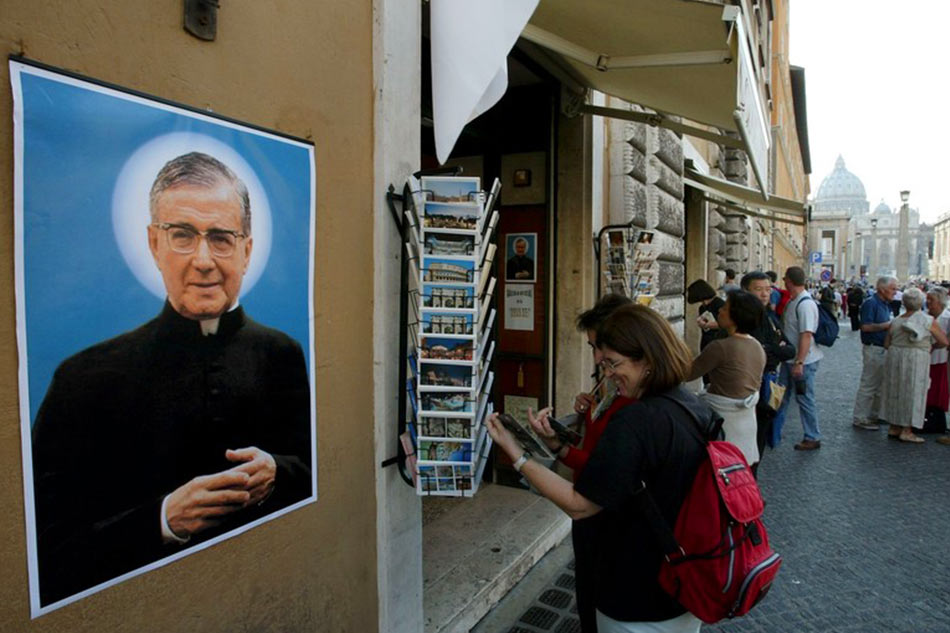Pope Francis reforms influential group Opus Dei | ABS-CBN
ADVERTISEMENT

Welcome, Kapamilya! We use cookies to improve your browsing experience. Continuing to use this site means you agree to our use of cookies. Tell me more!
Pope Francis reforms influential group Opus Dei
Pope Francis reforms influential group Opus Dei
Agence France-Presse
Published Aug 05, 2022 04:06 AM PHT
A shake-up of conservative Catholic organization Opus Dei came into effect Thursday, under a decree ordered by Pope Francis that experts say reduces its power and independence.
A shake-up of conservative Catholic organization Opus Dei came into effect Thursday, under a decree ordered by Pope Francis that experts say reduces its power and independence.
The evangelizing organization, which is present notably in Europe and Latin America and whose title means "God's Work", was given unique status in the Catholic Church under pope John Paul II.
The evangelizing organization, which is present notably in Europe and Latin America and whose title means "God's Work", was given unique status in the Catholic Church under pope John Paul II.
Since then, Opus Dei has become a kind of super-diocese operating across borders and answerable to the pope — drawing accusations of secretive behind-the-scenes power games that it has always denied.
Since then, Opus Dei has become a kind of super-diocese operating across borders and answerable to the pope — drawing accusations of secretive behind-the-scenes power games that it has always denied.
The reforms, announced by Pope Francis in a Motu Proprio edict last month, are part of wider changes to modernize and introduce greater transparency within the government of the Catholic Church.
The reforms, announced by Pope Francis in a Motu Proprio edict last month, are part of wider changes to modernize and introduce greater transparency within the government of the Catholic Church.
ADVERTISEMENT
From now on, the Opus Dei leader — the prelate — will no longer be appointed a bishop, and the organization becomes dependent on the Dicastery (or ministry) of the Clergy.
From now on, the Opus Dei leader — the prelate — will no longer be appointed a bishop, and the organization becomes dependent on the Dicastery (or ministry) of the Clergy.
Every year, instead of every five years previously, the prelate must submit to that body a report about its work.
Every year, instead of every five years previously, the prelate must submit to that body a report about its work.
"A form of governance based on charism more than on hierarchical authority is needed," the pope wrote in his decree.
"A form of governance based on charism more than on hierarchical authority is needed," the pope wrote in his decree.
Forty years after John Paul II's recognition in 1982, "Francis seeks to end an excessively hierarchical structure", noted Jesus Bastante, of specialist publication Religion Digital.
Forty years after John Paul II's recognition in 1982, "Francis seeks to end an excessively hierarchical structure", noted Jesus Bastante, of specialist publication Religion Digital.
In an open letter, Opus Dei Prelate Fernando Ocariz said he accepted the changes and urged members to follow the pope's appeal "to spread the call to holiness in the world".
In an open letter, Opus Dei Prelate Fernando Ocariz said he accepted the changes and urged members to follow the pope's appeal "to spread the call to holiness in the world".
ADVERTISEMENT
Opus Dei spokesman Manuel Sanchez told AFP: "Some have interpreted the Holy See's provisions in terms of downgrading, or loss of power.
Opus Dei spokesman Manuel Sanchez told AFP: "Some have interpreted the Holy See's provisions in terms of downgrading, or loss of power.
"We are not interested in this kind of reasoning, because for a Catholic there is no point in using categories of power or worldly categories."
"We are not interested in this kind of reasoning, because for a Catholic there is no point in using categories of power or worldly categories."
Opus Dei was founded in 1928 by the Spanish priest Josemaria Escriva de Balaguer, who died in Rome in 1975 and whose role under Francisco Franco's dictatorship remains controversial.
Opus Dei was founded in 1928 by the Spanish priest Josemaria Escriva de Balaguer, who died in Rome in 1975 and whose role under Francisco Franco's dictatorship remains controversial.
Opus Dei says it has currently around 90,000 members worldwide, 98 percent of whom are lay members, men and women, the other 2 percent priests.
Opus Dei says it has currently around 90,000 members worldwide, 98 percent of whom are lay members, men and women, the other 2 percent priests.
Members are encouraged to practice their faith through all parts of their lives, particularly through work.
Members are encouraged to practice their faith through all parts of their lives, particularly through work.
FROM THE ARCHIVES
ADVERTISEMENT
ADVERTISEMENT



